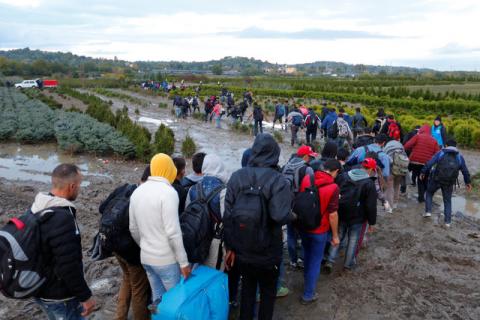Advertisement
Hungarian law risks exposing migrant children to sex abuse - watchdog
BUDAPEST (Reuters) - Hungary's new law to detain migrants in transit zones on its southern border will put children on the move at risk of exposure to sexual abuse, the watchdog Council of Europe said on Friday in a letter to Prime Minister Viktor Orban.
Hungary passed a law earlier this month to detain migrants in camps on its border with Serbia, a step which the United Nations said violates European Union law and will have a "terrible physical and psychological impact" on asylum seekers.
Under right-wing populist Orban, Budapest has locked horns with European and international partners over economic and democratic issues, most recently over migration which Orban says is a threat to Europe's socioeconomic make up.
In a letter to Orban, Claude Janizzi, the Chairperson of the Council of Europe Lanzarote Committee expressed concerns over the new legislation along with a reminder that in 2015 Hungary signed up to the European Convention that aims to protect children from sexual abuse.
He said under the new law, unaccompanied migrant children between 14 and 18 will be considered adults and will not benefit from child protection measures, including the appointment of a guardian.
As a result of the legal changes, "instead of having access to a guardian and being able to benefit from the child protection system, these children will be considered as adult asylum applicants, and placed in transit zones increasing the risk of becoming a victim of sexual exploitation and sexual abuse," Janizzi wrote.
"I therefore respectfully call upon you to ensure that child protection measures benefit all children without exception (including adolescents below 18 years of age)."
He called on Hungarian authorities to provide details within a month to show how unaccompanied children will be protected.
The Lanzarote Committee works on behalf of the Council of Europe, which protects and promotes human rights. The Committee is specifically in charge of monitoring the implementation of the Lanzarote Convention which protects the rights of children, and aims to prevent child sexual abuse and exploitation.
The Council of Europe cannot take cases to the European Court of Human Rights as the court is part of the same body.
However, migrants or their representatives could launch individual legal action since the Human Rights Convention applies to all, including non-EU citizens, and the court often refers to the Council's monitoring bodies in its judgments.
(Reporting by Krisztina Than; Editing by Julia Glover)



















Add new comment